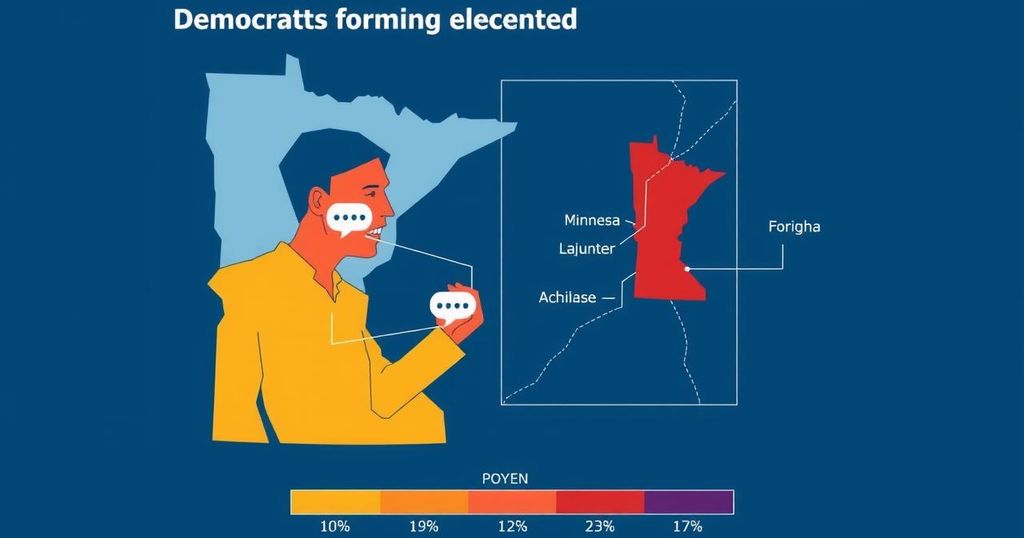World news
ABANDON HARRIS, ABDUL YUSUF, CAIR, COUNCIL ON AMERICAN - ISLAMIC RELATIONS, DEMOCRATS, ELECTION, ELECTIONS, GREEN PARTY, HARRIS, JILL STEIN, KAMAL, MIDDLE EAST, MINNESOTA, NORTH AMERICA, PARTY, POLITICS, POLL RESULTS, PRESIDENTIAL CANDIDATES, SEWARD, UNITED STATES, WEST LAKE STREET, WHITE HOUSE
Li Chen
0 Comments
Somali American Voters Shift Away from Democrats in 2024 Election
The Somali American community in Minnesota showed decreased support for Democrats in the 2024 presidential election, primarily due to dissatisfaction with the Israel-Gaza conflict, economic issues, and a sense of unaddressed concerns. Kamala Harris won Minnesota by a narrower margin than Joe Biden in 2020, with significant declines in East African precincts. Community leaders suggest that the Democrats’ actions led to a protest vote for Trump, indicating a broader shift in political allegiance among Somali voters.
The 2024 presidential election marked a significant decline in support for the Democratic Party from the Somali American community in Minnesota, a demographic that had previously constituted a solid voting bloc for Democrats. Concerns over the Israel-Gaza conflict, dissatisfaction with the economy, and feelings of neglect by the party contributed to this shift in political allegiance. Democratic nominee Kamala Harris won Minnesota but with much narrower margins compared to President Joe Biden’s victory in 2020. In particular precincts in Minneapolis with large East African populations, support for Harris decreased sharply; for instance, in Cedar-Riverside, her support dropped by 14 percentage points. Activists mobilizing against Harris in mosques and Somali malls expressed their discontent with the Biden administration’s stance on Israel, labeling it as facilitating genocide. Furthermore, interviews with voters revealed a broader disillusionment with the Democratic Party, driven by beliefs that the economy had fared better under former President Trump and a desire to preserve socially conservative family values. This sentiment was echoed by Abdul Yusuf, who noted that the community has shifted from being a bloc of automatic Democratic support. Harris’s association with Republican Liz Cheney and subsequent campaign strategies are viewed as detrimental to garnering votes from the community. Jaylani Hussein, the executive director of the Minnesota chapter of the Council on American-Islamic Relations (CAIR), observed how the Democratic ticket’s reduced margin of victory contrasted sharply with expectations given the party’s historical support from Muslim voters. Even though third-party candidate Jill Stein received some endorsements, her campaign faced challenges, evidenced by her poor performance in Minnesota compared to the prior election. Several Somali Americans expressed their frustrations through their voting choices, including some who voted for Trump as a protest against Biden’s administration rather than as an endorsement of Republican policies. Many within the community believe that the Democrats have taken their votes for granted while failing to address vital issues concerning their values and interests. This sentiment reflects an essential turning point for Somali American voters, signaling an evolving political landscape in Minnesota.
Historically, Somali Americans in Minnesota have been robust supporters of the Democratic Party. They have relied on the party for representation and advocacy on various issues. However, the alignment has recently begun to shift due to a combination of international and domestic concerns affecting this community. Events surrounding the Israel-Gaza conflict, economic hardship, and cultural issues regarding family values have led to a reevaluation of their political affiliations. The 2024 presidential election highlighted this trend, with many Somali voters expressing their discontent and seeking alternatives to traditional party loyalties, thereby indicating a significant change in their political behavior.
The voting patterns observed during the 2024 presidential election showcase a growing disenchantment among Somali Americans towards the Democratic Party, driven by important issues such as the Israel-Gaza conflict and economic concerns. The decline in support for Kamala Harris and the increase in votes for Trump highlight a shift in political dynamics that may have profound implications in future elections. This event serves as a crucial reminder for political parties to actively engage with and address the concerns of all communities, particularly those that have historically leaned in their favor.
Original Source: www.startribune.com




Post Comment